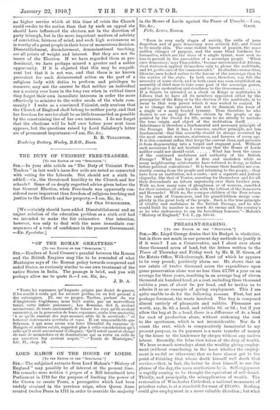PHEASANT-REARING.
[To THE EDITOR OF THE " SPECTATOR.1 SIR,-31r. Lloyd George denies that his Budget is vindictive, but is there not much in our present-day methods to justify it if it were ? I am a Conservative, and I shoot over about three thousand acres of land, but the letters written to the Times of Thursday and Friday week by Mr. R. H. Green, of the Estate Office, Willesborough, Kent (of which he appears to be very proud), positively alarm me. He shows that on one estate of twelve thousand acres the expenditure upon game preservation alone was no less than £3,700 a year on an average for three years, resulting in an average bag of eleven thousand six hundred head, at a cost, including three thousand rabbits a year, of about Gs. per head, and he invites us to admire it as an example of giving employment. This I am quite unable to do for the following reasons. First, but not perhaps foremost, the waste involved. The bag is composed almost entirely of pheasants and rabbits. Pheasants are worth, say, 2s. 6d. a head, and rabbits 8d. or 9d.; but if you allow the bag at 2s. a head, there is a difference of 4s. a head for cost of production alone, without reckoning the cost to the sportsman, which is not inconsiderable. Nor do I count the rent, which is comparatively immaterial to my present purpose, as its payment is a mere transfer of money by the lessee to the landowner by cheque without any useless labour. Secondly, the false view taken of the duty of wealth. We hear so much nowadays about the wealthy giving employ- ment (without considering in the least whether the employ- ment is useful or otherwise) that we have almost got to the point of thinking that whose doeth himself well doeth God service,—that, in fact, the better he does himself, to use the phrase of the day, the more meritorious he is. Self-enjoyment is rapidly coming to be thought the equivalent of self-denial. Thirdly, and principally, the misapplication of wealth. The restoration of Winchester Cathedral, a national monument of priceless value, is at a standstill for want of £18,000. Nothing could give employment in a more valuable direction ; but what would this lessee and others say in answer to a suggestion that they should so spend their money that way or on some other• public work, or that if they have so much to spend in giving employment, they should rebuild a slum without waiting to consider so nicely as people appear to be in the habit of doing whether such expenditure, however useful, will pay ? Every one, of course, is entitled to spend a certain amount upon recreation if he can afford it, but moderation seems to be a lost art. Have we forgotten, too, the striking and salutary lessons which " The Islanders" endeavoured to teach us Fourthly, the injurious effect upon the employed. In my part of the country it is not easy to get beaters, and those that come are labourers in full work who enjoy a day's outing. But professional beaters are different altogether. Their employment is easy, and it is better paid, perhaps, than that of the farm labourer ; but it is only occasional, and from its nature encourages loafing, and gives a distaste for regular work. The temptations to keepers afforded by extensive pheasant-rearing are enormous, and the effect is exemplified by the " Rex v. Millard " case in 1908. By far the larger portion of the outlay, of which Mr. Green gives particulars in his first letter, is attributable to pheasant-rearing, and in the interest of landowners themselves my great and earnest wish is to see it done away with. If only it could be considered "bad form" to bring pheasants up by band, sport would regain a more healthy tole, temptation in many directions would be checked, and a Tait amount of money would be set free for useful application. Our enemies also would be deprived of an occasion to blaspheme.—I am, Sir, &c..
A SQUIEEEN.







































 Previous page
Previous page